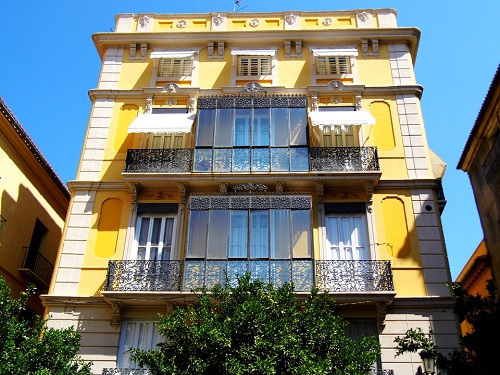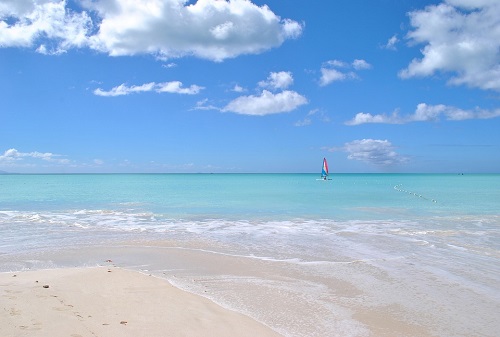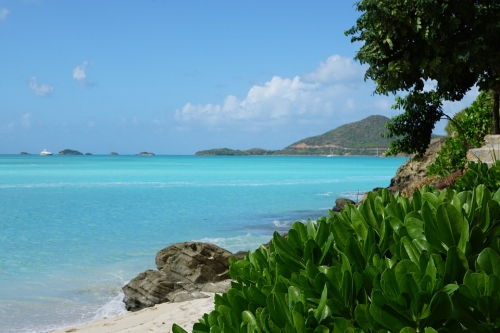Tropical climate, silver beaches, luxurious fauna, unique flora, friendly people and a laidback lifestyle are just a few terms that can be used to describe the idyllic twin islands of Antigua and Barbuda. This Caribbean spot has been a popular tourist and wedding destination for several years now. In the recent past, a number of citizens from the UK, US, Canada and Australia have also settled down here. English is the main language of communication, which makes it easy for many foreigners to get around and integrate themselves within the society.With its good business climate and stable political environment, the “Land of 365 Beaches” is also an excellent place for expatriates who are interested in buying property in the Caribbean. A number of well-known personalities from across the globe have invested in the housing market here. Many construction projects are under way, in spite of the fact that the combined population is barely 92,000. Buyers can pick from a huge variety of residential complexes, private villas, beachfront condos and luxury resorts.
You could either have a holiday home for whenever you visit Antigua and Barbuda, or earn a fixed income by way of rentals. Before making the decision to buy a house on these islands though, it is essential that you make a note of all the regulations that should be observed. The procedure is straightforward but time consuming and there are specific requirements which must be met before a foreigner can invest in real estate.
Below is a brief guide to purchasing property in this part of the Caribbean.
Popular Types and Areas
Before investing any money into the real estate market, think about the main purpose of the purchase. For example, would you like to live on the island, open up some kind of business or make money through rentals? Based on your requirements, you can choose a property ranging from a studio apartment near the city center to a 5-bedroom villa by the oceanfront.
Antigua and Barbuda has been divided into the parishes of St. John, St. George, St. Mary, St. Peter, St. Paul, and St. Philip on the island of Antigua, and the dependencies of Barbuda and Redonda.
While there are no specific expat communities, most of the foreigners tend to live:
• Around Falmouth and English Harbor in the South East
• In and around Jolly Harbor and Fryes Beach in the South West
• At Half Moon Bay and Browns Bay in the East
• Across Cedar Valley, Hodges Bay and Galley Bay, as well as their surrounding areas, in the North
You are more likely to come across expat style housing if you opt for one of these areas. However, property prices are likely to be higher in these regions too. Choose your location carefully, as it is the key to your lifestyle and the value of resale.
If you are planning to explore business opportunities in Antigua, a commercial property in the bustling capital of St. John may be more suitable, especially for a retail establishment. Other areas around Jolly Harbor and English Harbor are also developing at a fast pace commercially.
Property Prices
In the early to mid-2000s, Antigua and Barbuda were regarded as the best destinations for buying property and this led to a huge hike in real estate prices. Since then, the market has cooled down to some extent but not much has changed in the last four or five years. In general, housing costs on this island are fairly high compared to the rest of the Caribbean.
During boom time, the prices of homes in an area called Jumby Bay increased by 60%. When the financial crisis hit the island in 2008, the construction of many residential developments came to a complete halt. However, the economy expanded in 2015 and things started looking up for the builders.

Like in any other country, property prices in Antigua and Barbuda vary, depending on factors like construction, location, surroundings (proximity to beaches or popular spots), size and age of the premises. While there are no official price records for houses, research by the Global Property Guide shows that living space could cost anywhere between US $ 70 (£ 54.05, € 64.25) and US $ 200 (£ 154.42, € 183.56) per square foot. On average, you are likely to pay around US $ 350,000 (£ 270,228.54, € 321,233.55) for a 2-bedroom house and up to US $ 600,000 (£ 463,248.92, € 550,686.08) for a 3-bedroom home.
While you are calculating the overall cost of buying property on these islands, it is important to factor in the hidden costs too.
Additional Costs
When making an investment in real estate, you are likely to incur a number of expenses apart from the actual price of the property. It is imperative that you take these expenses into account beforehand, to avoid any problems once you initiate the purchase process.
• Alien Landholding License (ALHL): Any foreign national who wishes to own a house in Antigua and Barbuda has to first acquire a special license to do so. This requirement will increase your cost by at least 5%.
• Legal Fees: You are likely to pay at least 2% of the property value in legal fees, which usually include costs like the ECD20 registration fee of about US $ 7.41 (£ 5.72, € 6.80) and ECD50 Land Certificate fee of US $ 18.50 (£ 14.28, € 16.98).
• Stamp Duty: Both the parties of the transaction are liable to pay around 10% of the total sale value. As the purchaser, you are supposed to pay 2.5% of the purchase price towards the transfer charges; the seller’s share is much higher, at 7.5% of the sale value.
• Commissions: If you engage a real estate agent to help you with the search and purchase procedure, you will have to pay a commission that could range between 5% and 7% of the property value. This also applies to accountants, attorneys or other professionals that you may engage for the sale.
If applicable, you may also have to bear the additional cost of 3% government tax on a loan that has been taken through a local bank in Antigua and Barbuda.
A majority of the properties across the islands are freehold. If you are planning to lease the premises after purchasing it, you should make use of a real estate management company. The agents will take care of all issues that are likely to crop up, for about 10% to 20% of your monthly rental income.
Mortgages
Given the present economic scenario, getting a mortgage from a local bank is not easy for an expat. However, in the near future the government is expected to offer buyers the option of low-interest mortgages from the Antigua and Barbuda Development Bank as well as other commercial banks across the island.
Landholding License for Foreigners
In the current situation, the government of Antigua and Barbuda is taking many steps to encourage foreign investments and that is why these islands regarded as a tax haven by people from across the globe. On the other hand, you need to acquire a license before you can purchase any kind of real estate in this country, if you are a foreign national. The whole procedure could take between 3 and 6 months, so the deal is not likely to go through within a short span of time. Moreover, the license comes at an additional cost, which could increase your total expenditure by a fair amount.
Rental Yields and Income Tax
Expatriates hoping to earn a lot through property rentals are generally advised to invest in places other than Antigua and Barbuda because the prices as well as other costs on these islands are relatively high, and yet gross yields tend to be quite low, averaging about 4%. It may be a challenge to find a tenant on a long-term basis, since most people visit the island for a few weeks at the most. A majority of the tenancy agreements in Antigua and Barbuda are short-term leases.

You are also liable to pay net income tax on rents received, at a flat rate of 20%. Your income generating and depreciation expenses are deductible from the gross rent you earn, for you to arrive at your taxable income. As a resident of the island, you will be taxed on your worldwide income at a progressive rate, starting from 8% to 25%. On the plus side, there are no capital gains tax or inheritance taxes on the island.
Benefits of Investing in Antigua and Barbuda
In 2013, the island authorities introduced the Citizenship by Investment Program (CIP). This initiative offers eligible applicants full citizenship, in exchange for an investment of at least US $ 400,000 (£ 309,178.76, € 367,124.05) in the real estate sector. If this is one of the reasons for the purchase, do check that the property you are interested in is approved under the CIP. As a successful applicant, you as well as your family members will be granted citizenship and all the numerous benefits that come with it. However, not every expat can qualify for the program. The eligibility requirements have been listed down in the Antigua and Barbuda Citizenship by Investment Act 2013 & the Antigua and Barbuda Citizenship by Investment Regulations 2014.
A financial contribution is one of the primary qualifiers of applying under the CIP. You can choose any one of the three options listed below:
• An investment of US $ 400,000 (£ 309,178.76, € 367,124.05) in an approved real estate project. Please note that you have to own the property for at least 5 years before applying.
• A contribution of US $ 200,000 (£ 154,577.43, € 183,562.03) towards the National Development Fund. This payment is non-refundable.
• Being a sole or joint investor in an eligible business locally. The minimum amount for a sole investor is US $ 1,500,000 (£ 1,159,330.72, € 1,376,715.20) and for a joint investor is US $ 400,000 (£ 309,178.76, € 367,124.05) with a minimum of 2 people.
The first step in initiating the CIP is filling the government form (in English) and submitting it, with the required documents, to the Citizenship by Investment Unit (CIU). Most people approach an authorized agent for support with the paperwork.
Your application will be reviewed thoroughly by the CIU and you may also have to attend an interview. This step could take a while as strict due diligence is carried out to verify all the information you have provided.
Once you receive confirmation that your application has been approved, you will need to pay the fees in full. Your passport will soon be made available for collection either at the Consulate or Embassy in your home country, or in Antigua and Barbuda. You will also be asked to take an oath of allegiance at this time.
If you are purchasing property on this island mainly to become eligible for the CIP, do consider the additional costs beforehand. The fees are non-refundable and have to be paid in full by the time you receive the approval letter. Below is are the rates of the government processing fees.
• US $ 50,000 (£ 38,644.36, € 45,890.51) for the main applicant
• US $ 50,000 for the spouse and each dependent (children between 18 and 25 and parents above 65)
• US $ 25,000 (£ 19,322.18, € 22,945.25) for every dependent child under the age of 18
These amounts do not include cost of due diligence and passport issuance.
Selling Property
When making the decision to buy a house in Antigua and Barbuda, you should also understand the procedure and cost of selling property. As the landlord, you will be liable to pay the stamp duty fee of 7.5% as well as commissions in case you require the services of a real estate agent.
Have you bought property in Antigua & Barbuda? Share your experiences in the comments, or fill in the questions here to be featured in an interview!

